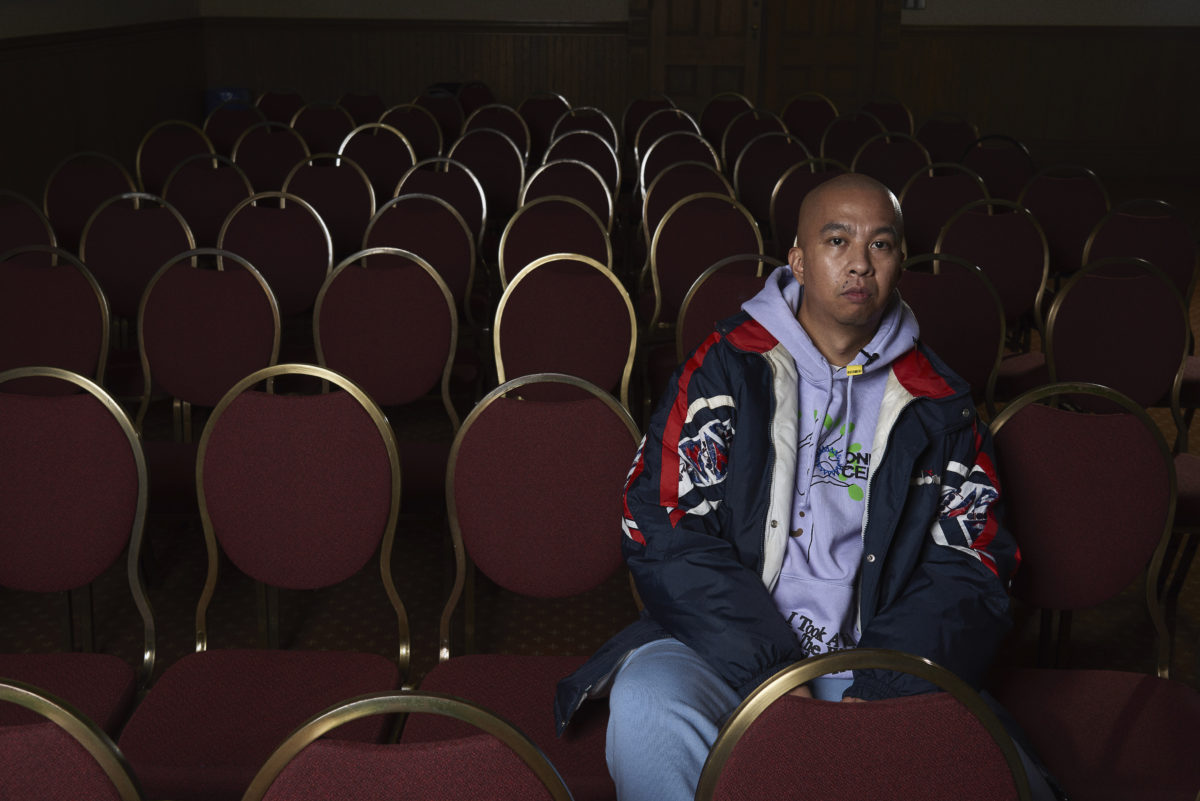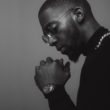He’s alone when he enters the University of Toronto’s Victoria College, for the Pro Audio Conference that’s part of Battle of the Beat Makers 2018. No entourage. No flash. He walks up to the registration table. Checks himself in.
He could easily be mistaken for one of the registered producers participating in the battles and the conference. But he’s not. He’s actually Grammy-award-winning producer !llmind who has worked with the likes of The Carters, Kanye West, Dr. Dre, Drake, J. Cole and more.
After he finishes a keynote talk at the conference, and a master class talking about sample kits, a handful of budding producers follow him outside eager to soak up even more of his wisdom. He engages with everyone. His humble, down-to-earth demeanour speaks volumes.
Only after event organizers manage to pry him away from the excited attendees is he able to sit down Urbanology Magazine to share his come-up story, difficult lessons learned and advice for the next generation.
So you said you came up in New Jersey and you come from a traditional Filipino background, kind of geared toward going into more like nursing, as you said like any immigrant family. What was the perception of your family when you decided to go into music?
It was pretty unanimous that I need to get a job and go back to school. My dad was a musician so he definitely understood it more than my mom. But in the beginning it was tough. A lot of pressure. You know I was still really young so it’s just going back and forth to school. I remember going into one college and getting accepted and then like dropping out after a year and then doing music and then I tried community college for a couple of semesters and that didn’t work out. So it’s just a lot of pressure on myself and pressure on them and I don’t blame them for it. I think at the end of the day they just want me to be successful and want the best for me. And my parents being immigrants from the Philippines, you can’t really blame them for not knowing the full workings of the music industry. You know like what a music producer is, how to get paid. I don’t blame them for that. Being as hard headed as I am, they eventually realized that their son he loves this too much. He’s not backing down. This is what he wants to do. So the longer I did it, the more successful I became, the more and more that they started to really realize and then the support came gradually.
How did you not get discouraged with something like that? Like did you have any mentors at the time who you were like kind of clinging to or anything that kind of kept you grounded and focused?
No mentors, no mentors. Really just sort of figuring it out on my own and then trying stuff. It’s just for me since the very beginning and it’s still true to this day. It’s just been a process of trying a bunch of stuff and figuring it out and failing along the way. But you know learning from my failures and embracing the few wins that I get every so often and that’s just been my life for the past 15, 16 years. I’ve been able to learn a lot and I’m still learning every day.
Tell me, back then, how do you get from Bloomfield, New Jersey to Philly to get to Beat Society?
I had this car, a Nissan Xterra, and I just used to drive to Philly. I had a friend of mine named DJ Philly and he went to my high school. He was older than me. He just used to DJ all the parties and so he was part of this collective with a few other DJs based in Philly. They used to DJ all the parties in Philly. And so I used to just go to the parties with him and do some networking and that was around the time that I was really kind of at the peak of, ‘OK, I’m a music producer, I have beats and my name’s !llmind and I work with rappers,’ and stuff like that. I just really got my start over there.
You came up in an era where social media was kind of about to start
Yeah. It was in the very beginning stages.
So you didn’t even have an Instagram or anything for people to find you at.
No. It was MySpace. That was the platform.
So now what would the platform be that people look for producers? How are they sought out?
Oh everything. I mean if you’re a music producer and you don’t have an account on every single social media platform then you’re shooting yourself in the foot. You know you should have an account on Twitter, Instagram, Facebook, artist page on Facebook, personal page. You should have a website. You have a SoundCloud, a YouTube. That’s bare minimum. Producers are discovered every day on any platform.
Are there specific people that are on the lookout for producers?
Yeah. If we’re talking about industry people or A&Rs, or even artists or artists managers that are looking for producers, I think they’re looking on every platform. They’re checking, they’re gonna Google you. If they type in your producer name in Google the thing you have to ask yourself is like what pops up first, which is super important. Does my Instagram pop up? Does my Twitter pop up? My Facebook? My SoundCloud link? They’re looking. They’re looking everywhere. I mean SoundCloud is still like a really, really great platform to be discovered. You know there’s people going to SoundCloud looking for producers all the time.
I’ll just get into this habit of just like going all the way left and just trying different things.
Where do you find inspiration like you do? Like how does it come about? How do you keep growing? How do you keep strengthening that craft?
For me it’s just curiosity, pure curiosity and living life. You know like life experiences inspire me in a lot of ways. You know even like small things like walking my dog every morning. I live in Brooklyn so I walk my dog early in the morning and the sounds that I hear inspire me sometimes and then traveling inspires me.
I always found that so crazy like how the things you see on a day-to-day basis inspire you to create art that you do in such a different way.
My curiosity for creating sounds and trying different things musically is also what inspires me. For me a lot of times I’ll just get into this habit of just like going all the way left and just trying different things. It’s almost like exploring different territories that you haven’t been before. Where in music it’s like trying a certain key or trying a different type of chord progression and just kind of letting the music dictate without having to think too much. So a lot of it is just curiosity.
What is it that helps keep you grounded? Like what makes you want to give back and help young aspiring artists?
Just constantly reminding myself that I ain’t shit. I’ve accomplished a decent amount and I’m ahead for a decent amount of people. But I’m not the biggest. And I think you know it’s similar to yoga. You know if you do yoga they say it’s a practice because you never really master yoga and you’re just practicing yoga. There’s always someone out there that’s gonna be quote unquote better than you at yoga. And I think it’s the same with music. Being a musician we’re practising music so I’m forever a student, forever practising, discovering. That’s what my mentality is with it.
Every day I wake up I feel like I’m just starting, like every day is day one. You’re broke. No one knows you.
It never got to your head? It’s easy to.
Never, no. Because there’s so much more I want to do. There’s so much more music to make. So many more ways to express myself creatively. Every day I wake up I feel like I’m just starting, like every day is day one. You’re broke. No one knows you. What are you gonna do today to change that? You know and that’s what I kind of habitually remind myself of every day. That’s just how it’s always going to be I guess.
Would you have any words of encouragement for someone who has been trying for so long and it’s not happening yet? Like how do you keep going if it’s not working right away?
I think it just depends on the person and what they’re trying to accomplish and what their definition of success is. If you define success as being a millionaire and having platinum records and Grammys – that’s a cool benchmark to aim towards. But I think you really have to look in the mirror and think about why you’re doing it and really think about whether or not you really love this shit because it’s like I said you got to do the thing that you’re willing to do for free for the rest of your life. And that’s most likely gonna be what your passion is. A lot of people get into music production for the wrong reasons – to be cool or to make money. You’re only gonna get so far if that’s your motivation. So my piece of advice would be to do a bunch of things and pick the thing that you enjoy the most. Put your chips into that and give that a try. And sometimes it is music production, sometimes it isn’t, but you just have to go for it and see what happens.
Do you ever make beats with an artist in mind or do you ever think, ‘Oh, this would sound good if Jay did it or if Kanye did it?’ Or do do they seek you out? Are they like, ‘I kind of want something like this,’ or is it a combination of both?
It’s kind of a random combination, but I think for me when I’m sitting there and I’m making music a lot of times I don’t have someone specific in mind. I just kind of create stuff that sounds good to me and I kind of let the music dictate that. So in the middle of the process of creating this piece of music I’m already thinking, ‘OK, this could sound good for The Weeknd or maybe this could be an instrumental. I let the music dictate. It just comes with depending on what I make in that moment.
You said Dilla is one of your favourites and he doesn’t have one specific sound either. So what was it about him that you were such a fan of?
That’s the thing, he has so many different types of sounds and genres, but you know it’s him. And I think that you know his signature sound. It was just something you can’t describe. It’s not like a specific snare drum or bass line or it’s just like the epitome of his creative decision making. In his brain. It’s almost like a sixth sense, this you know X factor that you can’t describe with your conscious mind.
Just quickly about like the financial and business aspect of it – how did you learn that if you’re just focused on creating the art? When sampling becomes involved for example. How do you know about the legal parts of that?
Having a good attorney. I’ve made a lot of mistakes in the past. Before I had a good attorney I’ve signed bad contracts. I didn’t know much about the financial side like saving money and paying your taxes the proper way and stuff like that. So those are all things I had to learn along the way and some of those things I made mistakes on and some things I didn’t. But the most valuable thing you can do when the time is right is to hire a good attorney to help you with the legal stuff. Because you know it’ll be a combination of finding a good attorney and doing as much research as possible about what how the music industry works. You know what music publishing is, what the royalties are. You know what happens if I get a placement on a big album. How do I get paid? How much do I get paid? Stuff like that.
If you’re addicted to it and it’s the first thing you think about when you wake up and the last thing you think about when you go to bed. Then that might very well be your passion…
Do you have any kind of advice for younger individuals who are up and coming and have a lot of pressure to go into a more conventional stream like health care or something like that?
Based off of my experience it’s going to be rough. You’re gonna have to deal with a lot of weight. You know obviously everyone’s situation is different. But you’re gonna have to be willing to sacrifice and it’s gonna be really uncomfortable for a long time. For some people it isn’t, or it is for 10 years and some people it’s for a couple of months, some people two years. It’s just so random. But at some point if you want to take that leap of faith and jump into your passion my biggest piece of advice would be just to make sure it really is your passion. And the best way to do that is to try a bunch of different things and find that one thing that you really, really love doing that you’re willing to do for free and give that a shot. ’Cause a lot of people pursue their passion early on at an early age. They might be in college, they might be a full-time nurse or have a full-time job and they want to jump into music production for whatever reason. You got to allow for yourself to fall in love with it. So try it. For a month. Try for a year or try for two years. If you’re addicted to it and it’s the first thing you think about when you wake up and the last thing you think about when you go to bed. Then that might very well be your passion and it might be time to think about jumping and taking that leap of faith and just giving it a shot.
You’d say it’s worth it?
Oh my gosh. Are you kidding me? Like it’s worth all of the hurdles they have to go through. And the thing you have to remember also is pursuing a passion isn’t a destination. There’s no light at the end of the tunnel. It’s just the only payoff really is the process. If you choose a passion that you don’t enjoy doing then life sucks you know. And you can have all the money in the world, but money isn’t gonna change that. So I chose a passion that I obsess about and I love doing all day, every day. The money was just a plus.
Did you know that early on?
Yeah. I wasn’t thinking about money or getting paid. I mean granted it was fucking reckless of course. You know like super reckless like late teens, early 20s jump off the cliff, drop out of school, no job, broke, friends out partying, me at home just want to play on my keyboard all day and make beats. That was life for me, for most of my early life. Was it risky? Fuck yeah it was, but I guess I stuck with it and I figured it out and the universe kind of aligned my life to be what it is and that’s what I did and that’s what I became. They say your future is hidden in your daily routine. It’s just like this quote that I’ve been obsessed with for the past 12 months and it’s true. I go back and I think about what my days were like and it literally was 8 a.m. make music until midnight and then go to bed, wake up, do the same thing and eventually you do that for six months to a year, two years, three years and the universe just looks at you and says, ‘Oh you’re a producer. Let me put this PR person in front of you to help you continue to be a producer because that’s obviously what you want to do all day.’ And I just became the thing that I did every day you know.
This interview has been edited and condensed for clarity and length.
Introduction by: Priya Ramanujam
Photos © Isa Miguel Ransome & Urbanology Magazine
This is one in a series of stories highlighting and celebrating beat makers and producers leading up to Battle of the Beat Makers 2019, taking place in Toronto August 29 to 31.
For tickets and more information, visit BattleOfTheBeatMakers.com.
Related reads:
Just Blaze: Musical Mastermind




2 Comments
Pingback: Mannie Fresh on why aspiring artists need to take more risks – Urbanology Magazine
Pingback: Bennie D mixes pain with passion on his beats – Urbanology Magazine